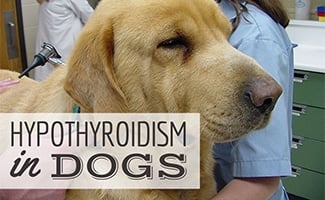Causes, Symptoms, And Treatment – CanineJournal.com
To sustain this free service, we receive affiliate commissions via some of our links. This doesn’t affect rankings. Our review process.

What Is Hypothyroidism?
Hypothyroidism occurs when the thyroid gland, which regulates the body’s metabolism, doesn’t produce enough hormones. This gland produces thyroxine, which the body uses to help turn food into energy (metabolism). When there isn’t enough thyroxine, low thyroid function, or hypothyroidism, is the result.
Hypothyroidism is a serious condition. If left untreated, this condition will result in a decline in your dog’s health, and, eventually, complications can lead to death.
What Are The Causes?
Two diseases cause 95% of hypothyroidism cases: lymphocytic thyroiditis or idiopathic thyroid gland atrophy.1 Lymphocytic thyroiditis, the most common cause of hypothyroidism, is a hereditary disease that causes the immune system to attack the thyroid as if it doesn’t belong. Idiopathic thyroid gland atrophy occurs when fat tissue replaces thyroid tissue. No one understands why either of these happens. Rare diseases, including cancer, cause the other 5% of cases.
Which Breeds Are Prone To Hypothyroidism?
You’re most likely to see hypothyroidism develop in medium to large breeds rather than smaller breeds. The most common breeds that deal with this condition are Airedale Terriers, Boxers, Cocker Spaniels, Dachshunds, Doberman Pinschers, Golden Retrievers, Irish Setters, and Miniature Schnauzers.
Symptoms

- Dark spots on the skin
- Dry eyes
- Ear infections
- Getting cold easily
- Hair loss
- High cholesterol
- Infertility
- Lethargy
- Skin infections
- Slow heart rate
- Stunted hair growth
- Unexplained weight loss
Behavioral Concerns Associated With Hypothyroidism
There’s a real concern about behavioral changes when a dog has hypothyroidism. You may notice that your dog becomes moody, erratic, anxious, and fearful. It’s also possible that you’ll see your pup show signs of depression, mental dullness, or a lack of concentration. It’s important to understand that if you notice drastic behavior changes, hypothyroidism could be to blame.
Skin Conditions Associated With Hypothyroidism
There are a few skin problems that occur when a dog has hypothyroidism. You might notice that your dog has dry, flaky skin, excessive dandruff, scaly skin patches, and skin infections (particularly skin staph infections) that don’t clear up quickly. It may help to use a hotspot ointment or a tea tree oil conditioning shampoo to calm and soothe the skin, but you should consult with your vet if you suspect any skin infections because your dog may require prescription medication.
Diagnosis
Your vet will conduct blood work to determine if your dog is experiencing hypothyroidism. The blood work will screen for thyroxine, the hormone the thyroid produces. If the hormone levels are low, your dog has hypothyroidism. Additional screening tests beyond the initial test depend on your pet’s specific condition.
Treatment
Treatment is relatively simple. You have to replace the missing thyroxine artificially. Medication is the easiest solution, but some people prefer natural options. Regardless of the treatment you choose, therapy is for life. You can’t cure hypothyroidism, but you can treat it.
Medication
The most common medication that vets prescribe for hypothyroidism is Levothyroxine. It’s a synthetic form of thyroxine, and when given in a proper dose, it will balance the hormones in the body and regulate metabolism. Your vet will need to check blood work regularly to determine that the dosage is appropriate.
Natural Treatment
There isn’t a perfect natural remedy for hypothyroidism, though there are natural ways to maintain a healthy thyroid. Only Natural Pet Canine Thyroid Wellness Chewable Tablets contain herbal ingredients to boost thyroid health.
It also helps to feed your up natural dog food with lots of nutrients to support your dog’s overall wellness in addition to supporting their thyroid health. Our experts personally recommend The Farmer’s Dog for nutritious, fresh dog food made from real, human-grade ingredients.
Diagnosing and treating hypothyroidism can be costly. Getting pet insurance while your dog is young and healthy can help ensure you can handle this and other unexpected medical expenses if and when they arise.
Other Thyroid Conditions In Dogs
Hypothyroidism is not the only thyroid condition a dog might experience. Here are a few other concerns:
Hyperthyroidism
This condition is almost the opposite of hypothyroidism. It occurs when the thyroid produces too much thyroxine. This thyroid issue is rare in dogs, but it can be very serious since thyroid cancer is usually the cause and involves a thyroid gland tumor. Symptoms include:
- Enlarged thyroid gland
- Excessive excitability
- Increase in hunger
- Increase in thirst
- Increase in urination
- Weight loss
Goiters
This growth is another possible thyroid concern. This non-cancerous lump may be a sign of congenital hypothyroidism or a nutrient imbalance. Symptoms include:
- Change in bark
- Enlarged neck
- Lump in neck
- Trouble swallowing
Video: What Does A Vet Have To Say?
In this three-minute video posted by The Intelligencer, Carol Erickson talks with Dr. Kelsey Hafer during an “Ask The Pet Vet” segment about dogs’ thyroid problems.
Annual Health Checks For Your Dog’s Best Health
You can control hypothyroidism easily once you’re aware of the condition. One way to stay on top of your dog’s best health is to have an annual check-up. Having your vet check out your pup once a year helps ensure they stay healthy and helps your vet notice any health changes that may occur.
What symptoms of hypothyroidism do you see in your dog?





